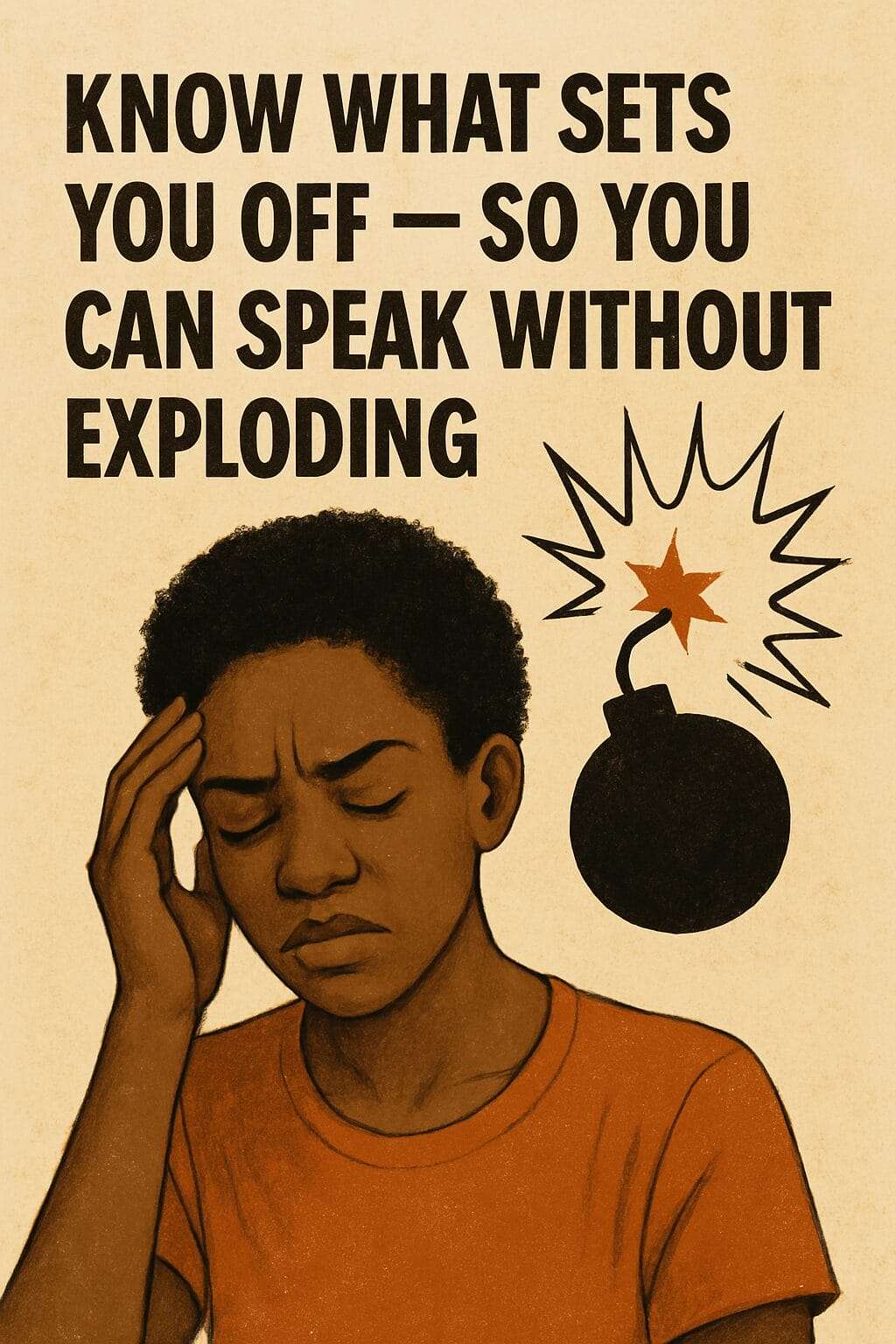
How to Communicate When Anxious: Speak Clearly Even Under Pressure
- Updated: April 8, 2025
Stress shows up in all kinds of ways—racing heart, sweaty palms, jumbled thoughts. We each react differently, but most of us were never taught how to pause, regulate, and clearly express what we’re going through.
As a healing and leadership coach, I know my clients can’t afford to live in constant anxiety. They need grounded strategies for self-regulation and clear communication—and fast.
In this article, I’ll walk you through practical ways to get your body and voice back online. But first, I want to share how stress used to hijack my own communication and why learning to self-soothe changed everything.
It can be hard to control your body and talk well, especially if the people who took care of you only showed you bad ways to behave like being too alone or too angry. But, there are good ways to feel good and get what you want. 💛
Denise G. Lee Tweet
It’s Hard to Communicate When You’re Overwhelmed and Anxious
When anxiety scrambles your words and silences your needs
For years, I lived in a quiet state of desperation. My body showed every textbook sign of stress—racing heart, sweaty palms, a flushed face—but I didn’t know how to communicate what was happening inside.
I kept thinking, “Why can’t people see I need help?”

Turns out, they could see something was off—long before I ever opened my mouth.
But what came out when I finally did speak wasn’t clarity. It was panic in the form of jumbled, disconnected thoughts:
“It’s not right!”
“They’re always out to get me!”
“I’m just so…”
I wasn’t expressing a need—I was leaking fear. And when your words feel chaotic, people don’t always lean in. They often back away.
To make things worse, I coped by numbing out. Alcohol, graphic sexual content, and meaningless hookups offered a temporary escape but left me feeling even more isolated. (You can read more about that train wreck of a season here.)
Looking back now, I understand: I never learned how to communicate when I was overwhelmed. And that made it almost impossible to get the comfort or support I desperately craved.
How to Speak Clearly When Anxiety Takes Over
When stress hijacks our nervous system and we feel anxious, our words don’t come out the way we want. We say too much, too fast—or nothing at all. Before we can communicate our needs, we have to get our body back online.
Let’s start with a simple but powerful tool:
1. Pause and Breathe Before You Speak
In anxious moments, most of us are wired to react—quickly and defensively. We raise our voice. We interrupt. We shut down. But that’s not communication—it’s survival mode.
What we need instead is a moment of choice.
The next time something stressful hits, try asking yourself:
“Will saying this help or hurt me later?”
This small question activates your prefrontal cortex—the thinking part of your brain—and gives you space to respond instead of react.
Biologically, here’s what’s happening:
Your amygdala (the brain’s fear center) is screaming, “Danger!” even if the threat is just a difficult email or an awkward conversation. Slowing your breath signals to your hypothalamus and parasympathetic nervous system that you’re safe.
Try this:
Close your eyes for 30 seconds.
Inhale deeply through your nose for 4 counts.
Hold for 4 counts.
Exhale slowly for 6–8 counts.
Repeat for up to 2 minutes.
This small reset tells your body, I’m safe. I can stay present. I can speak clearly.
It’s not about being calm—it’s about staying connected to your body while communicating your needs.
2. Know What Sets You Off—So You Can Speak Without Exploding
If you’re always on edge, you might not even know what’s bothering you until you’re in full-blown reaction mode. That’s the trap of chronic stress—it dulls your awareness until everything feels like a threat.
We all have emotional landmines. People, words, or situations that ignite past pain.
These are your triggers—and unspoken triggers will always hijack your communication.
For me, the phrase “calm down” was one of them.
What sounded neutral to others felt like a warning shot to my nervous system.
Why?

Because when I was younger, “calm down” always came before a violation. It wasn’t soothing—it was a setup. I carried that association into adulthood until I finally traced the connection.
That’s why identifying your emotional triggers isn’t about blame.
It’s about clarity.
Ask yourself:
What are the patterns behind my strongest reactions?
Who or what consistently leaves me dysregulated?
Can I step back from certain conversations, people, or situations—at least for now?
How can I create safety for myself before trying to explain my feelings to someone else?
Healing your stress response starts by honoring your pain—not performing through it.
And once you know your triggers, you can begin choosing your responses rather than being ruled by them.
3. Strengthen Your Emotional Awareness to Reset Your Nervous System
If you’ve ever found yourself snapping at someone or shutting down entirely in a tense moment, you’ve experienced what happens when your emotional intelligence is running on empty.

Understanding your emotions—and being able to read the emotions of others—is essential to managing stress. When you tune in to what you’re truly feeling, your body gets the signal that it’s safe to slow down. And when you can identify what others might be feeling, you lower the risk of miscommunication or unnecessary conflict.
Emotional intelligence is not about being perfect or polished. It’s about being honest, present, and curious. What’s underneath this tension? Why is my body reacting this way? What are they really trying to say?
The more you practice naming emotions and noticing patterns, the easier it becomes to calm your system before it spirals.
If you’re new to this work, start with books like Emotional Intelligence by Daniel Goleman or Why You Feel the Way You Do by Reneau Peurifoy. They offer practical tools that go beyond fluffy advice and help you understand what your body and mind are trying to tell you.
4. Set Boundaries and Stop Overloading Your System
For a long time, I confused being productive with being valuable. My schedule used to look like a Pinterest board gone rogue: client calls, blog writing, church commitments, family cooking, intense cleaning sprees—you name it. I wore exhaustion like a badge of honor.
But here’s the truth: Chronic overfunctioning is just another form of nervous system dysregulation.
You can’t communicate clearly or lead well when your brain is foggy and your body is in a state of near-collapse. I wasn’t the Energizer Bunny—I couldn’t keep going, even when my mind insisted, “I can keep going!”
Simplify to Stabilize
Feeling grounded starts with giving your nervous system fewer reasons to panic. That means tightening your to-do list and releasing the belief that everything is urgent. Ask yourself:
What actually needs to happen today?
What’s draining me unnecessarily?
Who or what keeps nudging me toward burnout?
Once you get clear, give yourself permission to do less. Plan for recovery time. Say no before your body does it for you. If you are don’t know how to maintain a healthy work-life balance, this article illustrates how to do it.
Don’t Be Afraid to Speak Up
Some of us were raised to push through everything in silence—to not ask for help, to not show vulnerability. But hiding your stress only isolates you further.
Instead, try saying:
“I’m overwhelmed and could use a little space.”
or
“I’m feeling anxious and don’t have the bandwidth to talk right now.”
It doesn’t have to be dramatic. It just has to be real.
You’re not meant to carry it all alone. And asking for support is one of the clearest, kindest forms of communication there is.
The image below sums up my tips. Next, I’ll share my final thoughts.

Final Thoughts
Learning to regulate your body, name your triggers, and speak clearly under pressure isn’t easy—especially if you grew up in an environment where it wasn’t safe to think for yourself or show emotion. That old “DON’T THINK” script can quietly sabotage your calm and your clarity.
But that life script can be rewritten.
With practice, support, and the right tools, you can ask for what you need without guilt, stay grounded in hard moments, and speak your truth without losing your composure. It’s not about perfection—it’s about presence.
If this resonates and you’re curious about working together, learn more about my healing and personal growth coaching here. You can also send me a message here to start a conversation or book a quick call.
And if you’d rather dip your toe in, start with this podcast episode where I talk with Reneau Z. Peurifoy about how our emotions really work—and how to stop letting them run your life.
You’re not broken. You’re ready for something better. Let’s explore that together.





